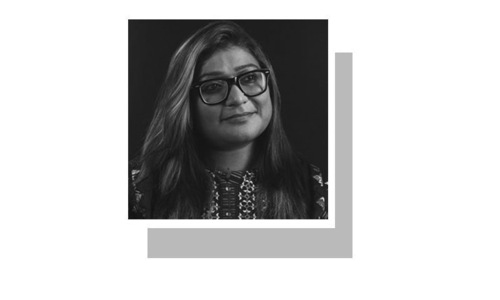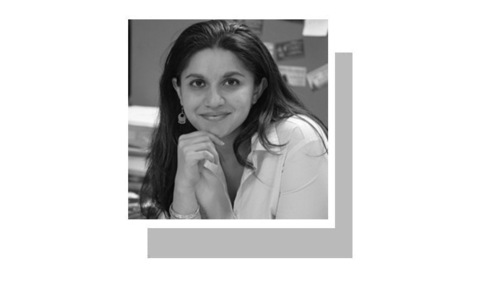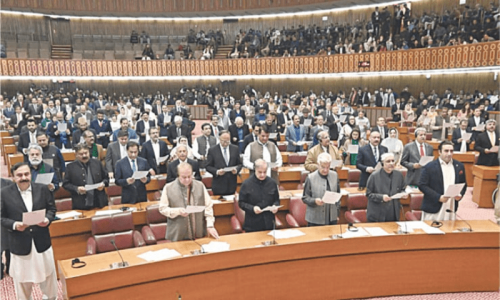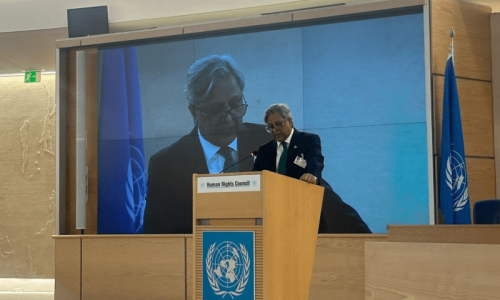A RELIGIOUS scholar, who has had to flee the country owing to his moderate views, sums up as follows the narrative that is being promoted by some madressahs in Pakistan openly ever since they were enlisted to carry on ‘jihad’ across the north-western border:
(1) Polytheism, kufr or apostasy, committed anywhere in the world are all punishable by death, and we have the right to implement this punishment. (2) Non-Muslims were born to be subjugated and none other than Muslims have a right to rule. Every non-Muslim rule is illegitimate, which we will overthrow whenever we have the capacity to do so. (3) All the Muslims of the world should be under the rule of a single caliphate. The independent smaller states have no legitimacy unless they are part of or subordinate to the caliphate. (4) The modern nation state is a form of kufr and has no place in Islam.
The first two postulates of this political ideology, based on a specific interpretation of the Islamic scriptures, seem to form the basis of the value system of the dastan fiction as it reaches us in written form dating from 1900 onwards. One would look in vain in the dastan narrative for the humanist values that run like blood in the veins of the classical, non-darbari poetry of all our languages in the subcontinent. The dastan was recited for the entertainment of the Muslim aristocracy who had no hesitation in calling themselves ‘royalty’ although they had gladly submitted as collaborators to the colonial rule of the British in exchange for their continued possession of big or small occupied land and other related perquisites.
The other two postulates of the current, prevalent madressah narrative in some madressahs had not come into existence in the period when the professional dastango (storyteller) was entertaining his patron with the tales of the exploits of imaginary, non-local invaders and conquerors. Changed times had forced the patrons to live under the rule of real, non-local invaders and conquerors from across the ocean; they had neither the capacity nor the inclination to resist the colonial rule as they themselves took pride in belonging to the invading tribes of foreign origin.
It is interesting to see that the educated Indian Muslim elite (the modern Turkophiles) were discovering the existence of the Turkish caliphate — the dying Ottoman Empire — as the possible leader of the ummah around the same time as uneducated patrons of the dastan and ghazal were indulging themselves, oblivious of the changing world around them. The resentment they must have felt at the unfortunate turn of events was, however, somewhat lessened by the religious fatwas of the ulema in their service declaring the British Ahl-i Kitab Christian brothers — as against the polytheist infidels that were earlier subjugated by Muslim invaders from the north-west.
Strangely enough, or perhaps not so strangely, such fatwas have been rampant in the latter part of the last century as well, during the time when we waged ‘jihad’ on our north-western neighbour to help the Ahl-i Kitab Americans achieve their hegemonic objectives. It was only after 9/11 that the sacred scriptures forbidding Muslims making Jews and Christians their friends and allies were brought into play. But that, as they say, is another dastan.
Also, the last postulate of the political ideology of Islamism — regarding the modern nation state being a form of kufr — was non-existent in the days of the dastan, as the nation state itself could not be imagined in this part of the world until it became a reality after 1947. The way the ideology evolves and adjusts to the changing present — while rewriting the past all along — is nothing if not fantastic. However, coming back to the dastan narrative, the local, polytheistic communities were made the Other, the enemy, that was required to be conquered, subjugated, killed, looted and ruled by Muslim invader-kings for the benefit of the story. As noted in my last piece (published in Books&Authors, Nov 1, 2015) they are not called by their real name but given the title Sahir. Looking at the following random quotes from the Tilism-e Hoshruba, a sharp contrast can be seen between the values privileged in the dastan fiction with the ones promoted and explored in the folk literature and classical poetry of the land — i.e. love among human beings defeating all attempts to impose division, discrimination and death:

“Amr Ayyar [popularly pronounced as Umru Ayyar by those approaching the text in its written Urdu form] replied, ‘My son, you are right. Now stay with me and enjoy the mela all of today and the coming night; visit the Bagh-e Jamshed, Chah-e Zamarrud, Bagh-e Ishrat, Bargah-e Tilismi and other such sights. Tomorrow is the 8th day of the mela and the crowd making merry. Tomorrow either we’ll get caught and lose our life, or we’ll rob the mela good and proper. And we’ll do it in a way that would leave every merrymaker denuded of their clothes and make them return home bare-bodied. Many of them will get killed and eaten by crows anyway.’”

“The high-born ones were buying sweetmeats while the lowly rustic ones were eating radishes, oats and gur… Suffice it to say that a big crater was created all of a sudden and all the damned Sahirs started to flee in confusion. When the place was thoroughly destroyed, Umru and other Ayyars began to kill and maim everyone around… They killed thousands, nay lakhs, of people. The mela was converted into a jhamela. Instead of buying and selling, human life began to sell cheap. The life of a nonagenarian and a 10-year-old had the same value. … Wounds had covered the earth with red so it looked plastered with rubies. … The slain ones were in a pile on the ground where the mela had been. … There was a big stampede all around. Everyone shouted: Run! Run! People were falling over each other running for their life. They were too confounded to find a way out of the mayhem. ... Shops were emptied of people. Then Umru started throwing the Ilyasi Jaal [a big net gifted to him by the Prophet Ilyas] and looting everything light and heavy with its magical power, saying quietly to himself: ‘Praise be to Allah who has granted me a few pennies for myself’. Other Ayyars too were busy looting shops of gold, clothes and precious stones. Their soldiers kept on making great piles of killed men. Each shop was looted by 10, thus emptying them of all the merchandise. But each man kept the loot for Umru, thinking that the Khwaja had given protection and owned the lion’s share of the maal-e ghaneemat. He was going to take stock of the loot and take his share anyway. In short, for all of two pehers there was a big tumult of loot and murder and those who had fallen to the sword lay one on top of the other.”

“He saw that lots of men, accompanied by women and children, with their headgear lost in the mayhem, were running in the desert raising clouds of dust. The Jadoogarnis [Sahiras] were stumbling along, out of their senses, hair undone, saris torn, some with missing blouses, others naked from the waist down, bewildered, forgetting their magic. The King of Sahirs summoned them and asked who they were and what had happened to them. They recognised their king and wept and cried that they were looted; their children massacred, and narrated the whole tale.”

“But the Ayyar who ran away after carrying out the task came to the lashkar. They told Mahrukh all that had come to pass. Everyone laughed aloud at the humiliation of the enemy. At last the celebrations started and all got busy drinking and watching the dancing girls.”
The entire Tilism-e Hoshruba is full of such graphic descriptions of the humiliation of infidel Hindus at the hands of Muslim warriors and their local, converted soldiers of fortune. This feature — completely blacked out by the Urdu critics showering uncritical praise on the supposedly great work of literature — stands second to the even more insidious display of misogyny which highlights the deep-seated feudal attitude towards women.
AJMAL KAMAL edits and publishes Aaj, an Urdu quarterly journal, from Karachi and runs a publishing house and bookshop. He translates and occasionally writes for English and Urdu publications.


















































